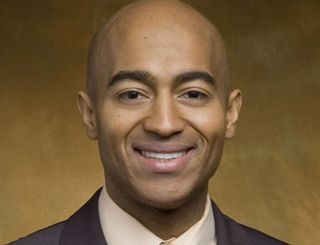The FCC’s Enforcer To Be Reckoned With

Remember the name Travis LeBlanc. He will likely be one of the most powerful members of the FCC not holding a seat on the commission, now that the commission, under chairman Tom Wheeler, is ramping up its complaint process related to the new Title II-based Open Internet order.
The order has three bright-line rules—against unreasonable blocking, throttling and paid prioritization—but other practices that fall outside of those, such as interconnection complaints, usage-based pricing and things the FCC hasn’t anticipated, will be addressed under a general conduct standard catch-all with the commission’s Enforcement Bureau tasked with investigating and taking action. And as chief, LeBlanc will head up that effort.
“Rules are only as good as their enforcement, and so we hope and expect that the agency will use these protections if and when carriers attempt unreasonable practices,” says Matt Wood of Free Press, which has pushed for new rules.
LeBlanc has shown a bulldog’s tenacity for hauling Internet service providers and others on the carpet in the name of protecting consumers, and he will be getting some new muscle under the Title II-based rules.
The day before Wheeler circulated the rules, in a letter to Sen. Ron Johnson (R-Wis.), the chairman told the senator he didn’t think it necessary to follow the General Accountability Office’s recommendation that the commission work with ISPs to develop a voluntary code of conduct on data use and pricing. The letter suggested that the FCC’s enhanced transparency rule, backed by enforcement, plus its streamlined complaint process, should be able to handle it all.
In a warning to ISPs last July about what the FCC billed as “hundreds” of open Internet complaints, the Enforcement Bureau threatened million-dollar fines, with LeBlanc promising to hold providers to account for any failures to deliver on their promises.
And in an FCC roundtable back in September, LeBlanc made it clear that Title II was very much on the table.
Broadcasting & Cable Newsletter
The smarter way to stay on top of broadcasting and cable industry. Sign up below
Although he reminded the audience that the session was on enforcement issues, not the underlying legal authority, he still said he wanted to remind the panelists and “those who are listening near and far” that Title II was in play. He even gave Title II top billing and Sec. 706 something of a supporting role, at least rhetorically, saying he wanted to highlight the differences “if the commission ultimately decides to rely on Title II, or some other legal authority, such as Sec. 706.”
LeBlanc, who has degrees from Princeton, Harvard, Yale and Cambridge (yes, all four), oversees 24 field offices. (The Enforcement Bureau is the FCC’s largest “organizational unit.”) Before that, as special assistant attorney general of California, he established that state’s first hi-tech crime and privacy enforcement units. And prior to that he served the Obama administration, advising the president and attorney general on constitutional and legal matters.
“The Enforcement Bureau under Le Blanc has not tried to settle things just to settle them,” says Harold Feld of Public Knowledge. “They’ve imposed real fines for violations, and required parties to put meaningful procedures in place to ensure that violations won’t happen again. We are going to need to see very early that the commission is serious about following up on complaints and violations.”
Contributing editor John Eggerton has been an editor and/or writer on media regulation, legislation and policy for over four decades, including covering the FCC, FTC, Congress, the major media trade associations, and the federal courts. In addition to Multichannel News and Broadcasting + Cable, his work has appeared in Radio World, TV Technology, TV Fax, This Week in Consumer Electronics, Variety and the Encyclopedia Britannica.

